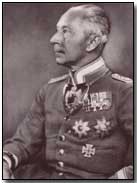Primary Documents - Crown Prince Wilhelm's Request to Lead His Army into Germany, 11 November 1918
 With Germany actively
seeking an armistice and revolution threatening, calls for
Kaiser
Wilhelm II to abdicate grew in intensity. Wilhelm was
himself deeply reluctant to make such a sacrifice, instead expressing a
preference to lead his armies back into Germany from the Western Front.
Upon being informed by his military advisers that the army could not be
relied upon not to harm him
Wilhelm abandoned the notion.
With Germany actively
seeking an armistice and revolution threatening, calls for
Kaiser
Wilhelm II to abdicate grew in intensity. Wilhelm was
himself deeply reluctant to make such a sacrifice, instead expressing a
preference to lead his armies back into Germany from the Western Front.
Upon being informed by his military advisers that the army could not be
relied upon not to harm him
Wilhelm abandoned the notion.
Wilhelm's abdication was announced by Chancellor Prince Max von Baden in a 9 November 1918 proclamation - before Wilhelm had in fact consented to abdicate (but after Social Democrat Philipp Scheidemann had announced the Kaiser's departure from the balcony of the Reichstag). Faced with a fait accompli Wilhelm formally abdicated and went into exile in Holland. His abdication proclamation was formally published in Berlin on 30 November 1918.
Faced with public criticism over the nature of Wilhelm's abdication German Army Chief of Staff Paul von Hindenburg issued a statement on 20 March 1919 explaining the sequence of events and defending the Kaiser's role.
In the wake of the Kaiser's abdication his eldest son - Crown Prince Wilhelm - expressed a desire on 11 November 1918 - the date of the armistice - to be allowed to lead his army back home to Germany (reproduced below together with the government's reply). His wish was, given the anti-royalist fervour of the moment, rejected out of hand by the government. He too went into exile in Holland, despatching a letter to Hindenburg following his arrival in which he explained and justified his position.
Having instigated the Kaiser's abdication Prince Max resigned, handing power to incoming Chancellor Friedrich Ebert who, in statements issued on 10 November and 17 November, appealed for public calm and reassured the German public that the incoming government would be "a government of the people".
Crown Prince Wilhelm's Request to Lead His Army into Germany, 11 November 1918
To Imperial Chancellor Ebert:
The Crown Prince urgently desires to remain at his post to do his duty like every other soldier.
He will bring his army back home in a well-disciplined and orderly manner, and undertakes to do nothing whatever at this juncture against the present Government.
What is the Government's attitude in this matter?
Reply from Government, 12 November 1918
After hearing Major Gen. von Wrisberg of the Prussian War Ministry, the Government must give its refusal to the request of the Crown Prince.
Source: Source Records of the Great War, Vol. VI, ed. Charles F. Horne, National Alumni 1923
A "biff" was a Bristol fighter plane.
- Did you know?
